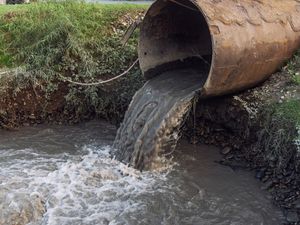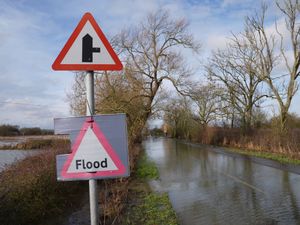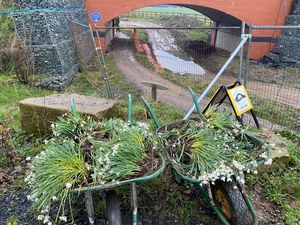Revealed: The number of hours raw sewage was released into the River Severn last year
Shocking data has revealed storm overflows in Shropshire were dumping raw sewage into the Severn for thousands of hours last year.
Data published by the Environment Agency (EA) on Wednesday, revealed that storm overflows dumped sewage into rivers and seas across England for more than 3.6 million hours in 2023 - more than double the previous year.
Due to the county's sewage systems that see rain and sewage share the same pipes, sewage is spilt into waterways to prevent the system backing up during periods of heavy rain - but environmentalists say the dumps should only be happening in exceptional weather.
But the EA has said the dramatic figures can be partly blamed on the country facing its sixth-wettest year on record.
While figures are now at their highest-ever levels, officials have cautioned that comparisons over the years are difficult as an increasing number of storm overflows have been fitted with monitors over time, and all now have the technology to record spills.
Nevertheless, the data was described as "disappointing" but "sadly not surprising" by the EA, while campaigners said the scale of discharges was a "final indictment of a failing industry".
Severn Trent figures show there was 440,446 hours of sewage spills from monitored storm overflow in 2023, up from 249,116 hours in 2022, along with another 60,253 hours of sewage spills from monitored storm overflows, compared to 44,765 hours they year before.
In Shropshire, Wednesday's data reveals some storm overflows dumped sewage into the Severn more than 100 times last year.
One overflow at Greyfriars Bridge in Shrewsbury spilt 128 times in 2023, for 2,467 hours. That's about 103 days, or the equivalent of around three months non-stop.
Slightly down the river towards Castle Fields, another split 120 times for 1,903 hours, or around 79 days non-stop.
Other storm sewers around the county town didn't fare much better, one off Smithfield Road spilt 103 times, while another at the Quarry spilt 97 times.
Down in Ironbridge, a sewer off Ladywood spent 446 hours dumping untreated sewage into the Severn during 60 spills, while another in Coalport spilt 71 times, for a total of 702 hours - or 29 days non-stop.
Bridgnorth appeared to fare slightly better than its riverside companions, the five storm overflows near Low Town together spilt 67 times, for a total of around 383 hours, or 15 days non-stop.

James Wallace, chief executive of the campaign group River Action, said: "The scale of the discharges by water companies is a final indictment of a failing industry.
"Having run amok with billpayers' money for decades, they discharged untreated sewage into rivers and coastal waters more than 3.6 million hours last year from 464,000 spills through storm overflows that are supposed to be only used in extreme weather events.
"That's a 105 per cent increase in the number of hours and a 54 per cent increase on spills on the previous year.
"Rather than investing in future-proofing their infrastructure, fixing leaky pipes, upgrading wastewater treatment plants, these international businesses have plundered our most precious natural resource, fresh water."
He called for reform of environmental regulators and for failing water companies to be refinanced and restructured to put people above profits.
Environment Agency Director of Water Helen Wakeham said the data was "disappointing" but "sadly not surprising."
"We are pleased to see record investment from the water sector," she added, "but we know it will take time for this to be reflected in spill data – it is a complex issue that won’t be solved overnight."
The government is urging water companies to go further and faster wherever possible to tackle sewage pollution. The Environment Secretary recently announced £180m in fast-tracked water company investment over the next 12 months, expected to prevent more than 8000 sewage spills polluting English waterways.
Water Minister Robbie Moore said: "I have been clear that sewage pollution in our waters is unacceptable, which is why in just the last few months we announced a consultation to ban water bosses’ bonuses when criminal breaches have occurred, quadrupled company inspections next year, fast-tracked £180m investment to cut spills, launched a whistleblowing portal for water company workers to report breaches, and will soon set out our plans to ban wet wipes containing plastic.
"We demanded that 100 per cent of overflows were monitored by the end of last year as part of our drive to improve transparency. Today’s data shows water companies must go further and faster to tackle storm overflows and clean up our precious waterways. We will be ensuring the Environment Agency closely scrutinise these findings and take enforcement action where necessary.”
Severn Trent has since said that it is investing in a range of initiatives to "improve river health" as it points the fingers at a particularly wet 2023.
A spokesperson for the water company said in 2023, the county experienced 34 percent more rain than in 2022, with the wettest period on record during Storm Babet.
They added: "Our overall impact on rivers has reduced, as our investment in our region continues to do our bit to create healthier rivers.
"On storm overflows specifically, we’re investing £384m in 2024/25 and by 2030, and a further £1.1b investment will see spills reduced from overflows to the lowest in the industry."
Severn Trent said a total of 2,472 storm overflows will undergo investment – each with its own individual action plan - with a variety of improvements ranging from increasing the capacity of storage tanks to introducing green nature-based solutions.
A spokesperson added: "The improvements will be split across Severn Trent’s counties and form part of the water company’s Storm Overflow Action Plan (SOAP).
"The plan, which will be regularly updated as improvements are made, will reduce the number of spills into watercourses across the region, ensuring that by 2040 no overflow will spill more than 10 times in an average year in high priority areas, and in all areas by 2045, five years ahead of Government targets."
Number of hours of sewage spills from monitored storm overflows
– Anglian Water: 273,163 hours (2022: 89,514 hours)
– Northumbrian Water: 280,029 hours (107,536)
– Severn Trent Water: 440,446 hours (249,116)
– South West Water: 530,737 hours (290,271)
– Southern Water: 317,285 hours (146,819)
– Thames Water: 196,414 hours (74,693)
– United Utilities: 656,014 hours (425,491)
– Welsh Water (in England): 23,354 hours (9,470)
– Wessex Water: 372,341 hours (129,957)
– Yorkshire Water: 516,386 hours (232,054)
– Total: 3,606,170 hours (1,754,921)
Average duration of sewage spills from monitored storm overflows
– Anglian Water: 8.6 hours (2022: 5.6 hours)
– Northumbrian: 6.0 hours (3.6)
– Severn Trent: 7.3 hours (5.6)
– South West Water: 9.1 hours (7.7)
– Southern Water: 10.8 hours (8.8)
– Thames Water: 11.6 hours (9.3)
– United Utilities: 6.7 hours (6.1)
– Welsh Water (in England): 5.6 hours (3.4)
– Wessex Water: 9.0 hours (5.9)
– Yorkshire Water: 6.6 hours (4.3)
– All companies: 7.8 hours (5.8)
Total sewage spills from monitored storm overflows
– Anglian Water: 31,623 (2022: 16,082)
– Northumbrian Water: 46,492 (29,697)
– Severn Trent Water: 60,253 (44,765)
– South West Water: 58,249 (37,649)
– Southern Water: 29,494 (16,688)
– Thames Water: 16,990 (8,014)
– United Utilities: 97,537 (69,245)
– Welsh Water (in England): 4,204 (2,800)
– Wessex Water: 41,453 (21,878)
– Yorkshire Water: 77,761 (54,273)
– All companies: 464,056 (301,091)
Average number of spills per monitored storm overflow
– Anglian Water: 22.2 (2022: 15.3)
– Northumbrian Water: 30.1 (20.3)
– Severn Trent Water: 24.9 (18.4)
– South West Water: 43.4 (28.5)
– Southern Water: 30.7 (17.8)
– Thames Water: 27.9 (17.0)
– United Utilities: 45.4 (35.1)
– Welsh Water (in England): 35.0 (23.3)
– Wessex Water: 32.0 (18.5)
– Yorkshire Water: 35.9 (25.6)
– Overall average: 33.1 (23.0)





